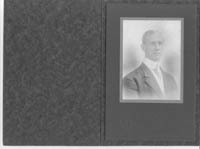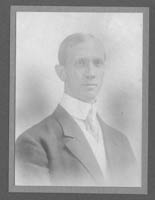Table of Contents
Key Figures
YMCA Secretaries
a | b | c | d | e | f | g | h | j | k | l | m | n-o | p | r | s | t-u | v | w | y-z
Dirk Johannes Van Bommel
After three years service as the honorary secretary of the Amsterdam YMCA, Van Bommel traveled to the United States to attend the Springfield Training School, from which he graduated in 1911. Although a Dutch national, the International Committee in New York sent Van Bommel to Turkey in March 1912 to serve as the Associate Secretary of the Constantinople YMCA. While he was studying Greek in Greece, Van Bommel worked with the Refugee Relief Committee in Salonica from November 1912 to March 1913 during the First Balkan War. In May 1914, with the departure of Darius A. Davis, Van Bommel became the Acting General Secretary of the Stamboul Association, a position he would hold until 1919. The advent of the First World War greatly hindered YMCA activities in the Ottoman Empire and in December 1916 Van Bommel discontinued active Association service. The Dutch government rented the YMCA building and Van Bommel became a member of the Dutch embassy staff, serving as attache for prisoner of war work. He supervised POW relief work for Allied POW's in Turkey, with a staff of twenty-five workers, and became a liaison between the Turks and Germans and the Allies. In June 1919, Van Bommel went on furlough in the United States, but he returned to Turkey in November 1920 where he became the Executive Secretary of the Stamboul Association. In 1921, Van Bommel served as General Secretary of the YMCA in Turkey. After working in Turkey for five more years, he agreed to become the General Secretary of the Turin YMCA in Italy. He retired from Association service in September 1929.
Paul Vetterli
A Swiss YMCA Secretary, Vetterli volunteered to serve as a War Prisoners' Aid worker in Austria-Hungary for the World's Alliance as a replacement for the American WPA Secretaries who departed the empire in April 1917. He arrived in the Dual Monarchy in September 1918, shortly before the Austro-Hungarians signed an armistice and released their Allied captives.
Janos Victor
A Hungarian YMCA leader, Victor was a leader in the Hungarian Christian student movement. Victor wrote a number of books and pamphlets to promote the Association's development in the kingdom. He attended the World's Student Christian Federation meeting in Constantinople in 1911 as one of the Hungarian delegates. Victor hosted John R. Mott's visit to Budapest in April 1911 for a student conference. The Student Christian Movement had plans since 1895 to establish a student organization in Hungary, calling it"that race whirlpool of Europe." Student movement plans had to be postponed with the advent of the First World War. Victor hosted Mott's June 1916 visit to Budapest during one of the American General Secretary's wartime visits to Europe. They visited a prison camp in Hungary to inspect the work of the War Prisoners' Aid program.
Eduoard Voellmy
A Methodist minister with a congregation in Berne, Switzerland, Reverend Voellmy volunteered to serve as a World's Alliance War Prisoners Aid Secretary in Austria-Hungary after the American WPA Secretaries left the Dual Monarchy in April 1917. Voellmy was an ideal candidate as a WPA worker because he spoke French, German, and English. The World's Alliance assigned Voellmy to Bulgaria where he served as one of five secretaries supervised by Ernst Sartorius. Christian Phildius recommended that Voellmy as one of three WPA Secretaries to begin work with Allied POW's in Turkey after negotiations with the Ottoman Empire in January 1918.
Emil Vonaesch
This Swiss YMCA secretary volunteered to serve as a War Prisoners Aid Secretary for the World's Alliance after most of the American WPA Secretaries left the Dual Monarchy in April 1917. Vonaesch was responsible for conducting POW relief operations in Bohemia, at Theresienstadt and Deutsch-Gabel, and in Styria, at Reichenberg, by July 1918.

